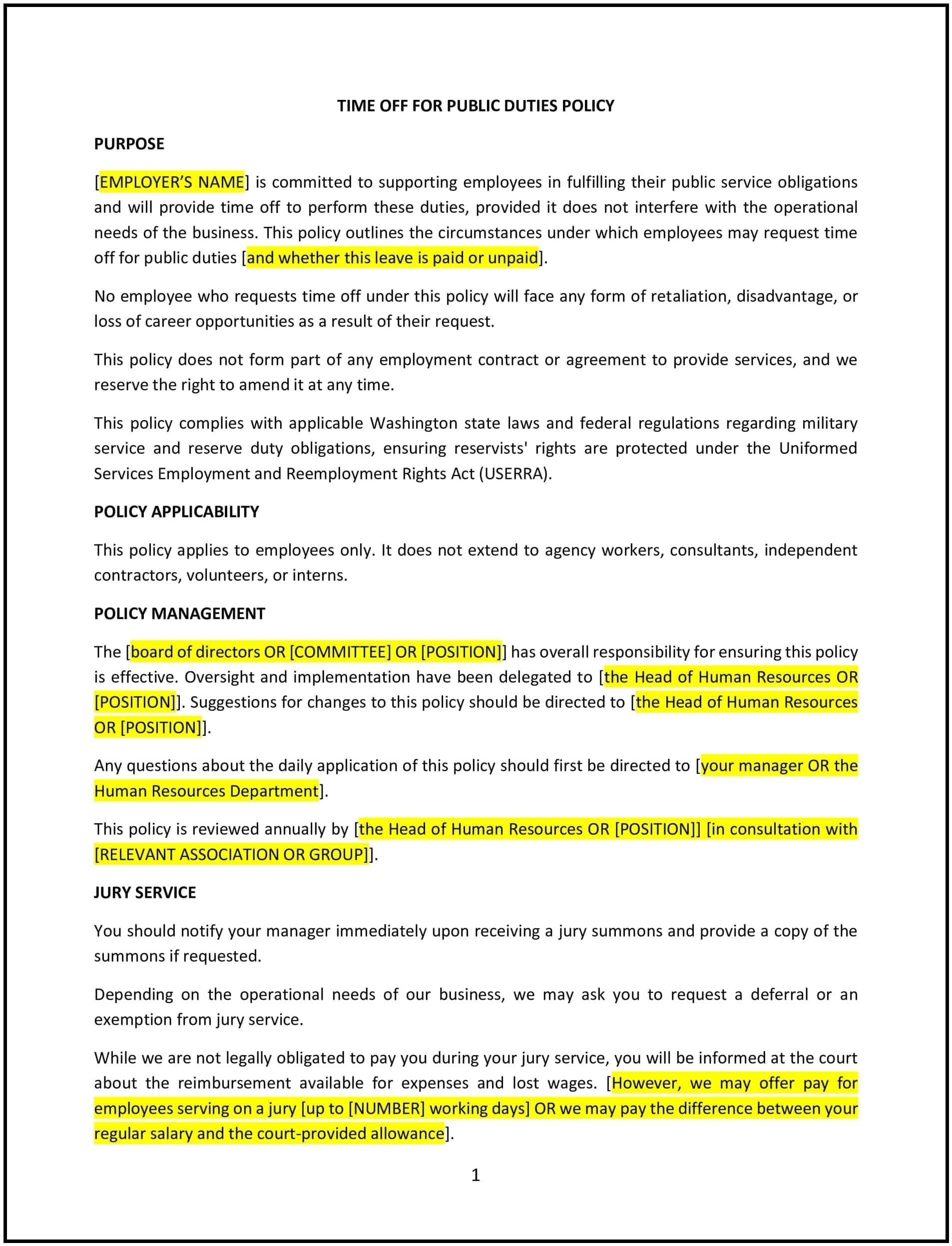Time off for public duties policy (Washington): Free template
Got contracts to review? While you're here for policies, let Cobrief make contract review effortless—start your free review now.

Customize this template for free
This time off for public duties policy is designed to help Washington businesses manage employee requests for time off to fulfill public duties, such as jury duty, voting, or other civic responsibilities. The policy outlines the circumstances under which employees can take time off for public duties, the process for requesting time off, and the expectations for both employees and employers during these periods.
By adopting this policy, businesses can ensure that they are complying with Washington state laws regarding public duty leave, while also supporting employees' civic engagement and ensuring minimal disruption to operations.
How to use this time off for public duties policy (Washington)
- Define public duties: The policy should specify what constitutes public duties, including activities such as jury duty, voting, serving on government boards, or other civic responsibilities required by Washington state law.
- Clarify eligibility and leave duration: The policy should define who is eligible for public duty leave and how much time off employees are entitled to for public duties. It should also specify whether employees are paid during this time off and if there are any limits on the duration of leave.
- Set procedures for requesting leave: The policy should outline the steps employees must take to request time off for public duties, including how far in advance they need to submit their request and any required documentation (e.g., jury summons).
- Address pay during public duty leave: The policy should specify whether employees will receive their regular pay during public duty leave or if the time will be unpaid. In Washington, jury duty leave is typically paid for nonexempt employees, but this may vary depending on the business.
- Specify job protection: The policy should emphasize that employees are entitled to take public duty leave without fear of retaliation or job loss. The policy should make it clear that taking time off for public duties will not impact the employee’s employment status or position.
- Ensure compliance with Washington state laws: The policy should ensure compliance with Washington state laws regarding public duty leave, including laws related to jury duty, voting, and other civic obligations. The policy should also include any provisions regarding compensation for time off as required by law.
- Review and update regularly: Periodically review and update the policy to ensure it remains compliant with Washington state laws, federal regulations, and any changes in company operations. Regular updates will help ensure the policy stays relevant and effective.
Benefits of using this time off for public duties policy (Washington)
This policy offers several benefits for Washington businesses:
- Promotes legal compliance: The policy helps businesses comply with Washington state laws related to public duty leave, reducing the risk of legal penalties or employee disputes.
- Promotes civic engagement: By offering time off for public duties, businesses demonstrate a commitment to supporting employees' civic participation, which can enhance the company’s reputation as a responsible employer.
- Reduces employee stress: Employees who are supported in taking time off for public duties are less likely to experience stress or conflict between their job responsibilities and civic obligations, improving overall employee morale.
- Enhances employee retention: Providing time off for public duties can increase employee satisfaction and loyalty, leading to improved retention and long-term engagement.
- Minimizes operational disruption: The policy helps businesses manage employee absences due to public duties by providing clear guidelines and expectations, ensuring minimal disruption to operations.
- Reinforces fair treatment: The policy ensures that all employees are treated fairly and consistently when it comes to taking time off for public duties, promoting a culture of equality and respect.
Tips for using this time off for public duties policy (Washington)
- Communicate the policy clearly: Ensure that all employees are aware of the time off for public duties policy and understand how to request time off for jury duty, voting, or other civic responsibilities. Include the policy in the employee handbook, review it during onboarding, and provide periodic reminders.
- Monitor leave usage: Keep track of employees’ time off for public duties to ensure that the policy is being followed and that leave is being used appropriately. This will help prevent any confusion or misunderstandings regarding time off.
- Ensure consistency: Apply the policy consistently across all employees to ensure fairness and avoid discrimination. Make sure that employees are not penalized for taking time off for public duties and that all leave requests are handled according to the same guidelines.
- Offer flexibility when possible: While the policy should outline the procedures for requesting time off, it’s important to offer flexibility when possible to accommodate employees’ specific needs, especially in cases of extended public duty leave.
- Address disruptions promptly: If an employee’s public duty leave results in significant disruptions to business operations, address these disruptions promptly by adjusting work schedules or temporarily reassigning duties, as necessary, to ensure business continuity.
- Review and update regularly: Periodically review the policy to ensure it remains compliant with Washington state laws, federal regulations, and any changes in the company’s operations. Regular updates will help keep the policy relevant and effective.